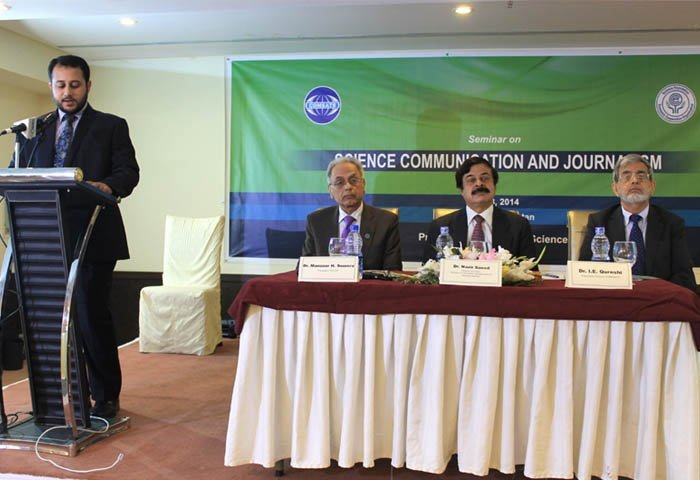
STAFF REPORT ISB: Noting with concern the inadequate coverage of science related activities in local media, speakers at a recently held workshop have stressed the need to popularize the potential, achievements as well as research and development activities of local science and technology sector through media which is the major instrument of shaping the public opinion on certain lines.
The seminar titled “Science Communication and Journalism” was organized by the Commission on Science and Technology for Sustainable Development in South (COMSATS) in partnership with the ECO Science Foundation in Islamabad.
A number of media representatives, scientists, faculty members of media sciences, university students, web-based forums, and officials of COMSATS Headquarters and ECO Science Foundation participated in the seminar.
In his remarks, Federal Secretary Information Dr. Nazir Saeed, who was the chief guest, said that the national media can play an important role in building scientific culture among the masses by sensitizing them about the scientific and technological advancements and their impact on the life of a common man. He pledged his Ministrys support to any initiatives proposed in this regard.
He urged the national media to devote at least five per cent of their media space to promoting a culture of science in the country.
Executive Director COMSATS, Dr. Imtinan Elahi Qureshi, highlighted the importance of the theme of the event. Dr. Qureshi stated that the work of scientific institutions mostly remains under reported and the contributions that Pakistan has made to the progress of science and technology in the developing world are seldom highlighted, a fact which is discouraging to many important international scientific organizations based in Pakistan.
He stressed creating triangular relationship between the scientists, journalists and public for effectively communicating the benefits of science and technology to society.
On similar lines, and President ECOSF, Dr. Manzoor Hussain Soomro, considered the seminar an important initiative for starting a campaign in a subject area which has been overlooked for a long time. He called for institutional arrangements involving relevant stakeholders, especially scientific and academic organizations in Pakistan, in order to encourage science journalism in the country.
The three technical sessions of the event covered the fundamentals of Science Journalism, contemporary issues and the role of various media for science communication. Chief Editor monthly Global Science, Karachi, Aleem Ahmed; and Editorial Consultant Express Tribune, Khalid Rahman, delivered the keynote lectures, while Ameen Amjad Khan, a freelance journalist; Saadia Ishtiaq Nauman, Lecturer FJWU; Sayed Paras Ali, Editor weekly Technology Times, and CEO web-based TechTV; addressed on the occasion.
In his remarks, Sayyed Paras Ali said that science and technology can be a potential source to reduce poverty. He suggested that all the stakeholders need to concentrate on promoting electronic media as this medium has increasingly wider outreach in the era of advance information technology.
In his online address from Italy, Edward W. Lempinen, Public Information Officer at The World Academy of Sciences (TWAS), talked about science policy, diplomacy and education in the developing world. Joanne Manaster, Faculty Lecturer, University of Illinois at Urbana-Champaign, giving her presentation from USA, highlighted the role of social media in promoting science in the modern world, while Shireen Gul, Copy-editor, Illinois Institute of Technology (IIT), USA, made a presentation on Science Journalism for Social Media.
The event concluded with a roundtable discussion on a high note of appreciation from the speakers and the participants. Dr. Anwar Nasim, Secretary General, Pakistan Academy of Sciences, made an analysis of the situation of the Science Journalism in Pakistan.
An important pledge made during the discussion related to the formulation of a Science Journalist Association of Pakistan, the participants pledged to immediately initiate work to make such an institutional arrangement possible.